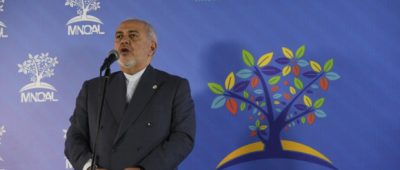Iran Increases Economic and Political Collaboration with Latin American Allies

After spending a week in New York for high level meetings at the UN, Iran’s Foreign Minister Javad Zarif made his way on July 20th to South and Latin America to attend a few conferences and meetings in Venezuela, Nicaragua, and Bolivia.
His first stop was the Non-Aligned Movement conference in Caracas, Venezuela on July 20-21st. The theme was “Promotion and Consolidation of Peace through Respect for International Law”. Zarif said “Since the United States is implementing interventionist policies in the American continent, it is necessary that a group of independent states show resistance in the face of such policies”.
One of the main topics of discussion was crippling sanctions imposed by the United States on countries such as Iran, Venezuela, and Nicaragua among others.
Iran’s Foreign Minister and Venezuela’s legitimate president Nicolas Maduro also spoke about ways to boost bilateral relations between their two countries, among other interests.
While at the NAM conference in Caracas, Zarif also noted that the US is in fact engaging in “economic terrorism” through these economic sanctions. Zarif read the definition of terrorism to the attendees, “the unlawful use of violence or intimidation, especially against civilians, in the pursuit of political gains”. Then Zarif urged NAM members to discontinue using the term sanctions and use the correct terminology, of “economic terrorism”.
Zarif said,
“I suggest that all of us deprive the unlawful, basically lawless US government from using a terminology that has lawful connotation, this is economic terrorism pure and simple, we need to repeat it again and again. And we do not negotiate with terrorists”.
In a tweet on July 22nd Zarif reiterated,
“Today at NAM meeting on sanctions I said, “Terrorism is the use of violence and intimidation against civilians in pursuit of political aims.” The US is thus engaged in #economic terrorism. It cannot be called “sanctions”, as they’re not designed to enforce laws. They in fact violate law.”
Russian Deputy Foreign Minister Sergei Ryabkov during the same conference said
“The US methods towards Venezuela are similar to other places where the US wants regime changes. By one hand, the US holds Venezuela by the throat, introducing immense measure of coercive measures, and then these limitations impede the country’s normal development.”
The Non-Aligned Movement (NAM) is the largest grouping of states after the United Nations. It is comprised of 120 developing world members that are not formally aligned with or against any major power bloc.
After leaving the NAM conference Zarif headed to Nicaragua. In a tweet on July 23rd, Zarif wrote
“In Managua, I offered congratulations to the people and government of #Nicaragua on the 40th anniversary of their revolution. Iran and Nicaragua have both resisted US’ #EconomicTerrorism and aggressive interventions. We’ve agreed on wide-ranging cooperation between our two nations.”
After leaving Nicaragua, Zarif traveled to Bolivia where he attended a session at Gabriel Rene Moreno University. While there Zarif told students that they are the future, and to believe in their power, and that they do not need to follow the powerful. He also said that they can lead with self-confidence and innovative ideas. Zarif mentioned this in a tweet on July 23rd.
In a tweet on July 23rd Zarif said that he was honored to meet with Bolivian President Evo Morales in Santa Cruz that morning. He also said that he had a pleasant and fruitful working lunch with Bolivia’s Foreign Minister. He said that he was going to another university and sign a MoU on technological cooperation: “Iran’s gift of nano-tech lab will arrive soon”.
What’s evident in these meetings is that increased economic and political collaboration with fellow nations in South and Latin America that have suffered at the hands of the United States is high on Iran’s foreign policy agenda. While in Nicaragua, Zarif noted that many nations are trying to rely less on the US dollar in international transactions.
This year in particular, we are seeing a geopolitical split which has formed two camps, those who continue to support using the US dollar as a universal financial tool and those who are using alternative financial means for trade.
Some of the factors that have brought this on, include increased economic sanctions and trade conflicts. The top five states that are ditching the dollar are: China, India, Turkey, Iran, Russia. This article illustrates the reasons behind each of these nation’s decision to move away from relying heavily on the US dollar.
In an article titled “A World without Dollars? Are We Approaching the End of America’s Financial Order?” Timothy Alexander Guzman addresses this topic in further detail. Guzman wrote “For Washington, the U.S. dollar is leverage, a financial weapon to dominate the world economy, to impose its foreign policy agendas and to secure a steady flow of natural resources over sovereign countries who use the currency.”
Nations that have faced the wrath of US imperialism through regime change, and economic terrorism through sanctions, need to come together and face this behemoth together. Strength in numbers is the only way to bring about serious change on the world political stage. A coordinated strong shift away from the US dollar will hit the “greatest” nation in the world where it hurts the most.
*
Note to readers: please click the share buttons above or below. Forward this article to your email lists. Crosspost on your blog site, internet forums. etc.
This article was originally published on the author’s blog site: The Rabbit Hole.
Sarah Abed is an independent journalist and political commentator. For media inquiries please email [email protected]
Featured image is from the author

